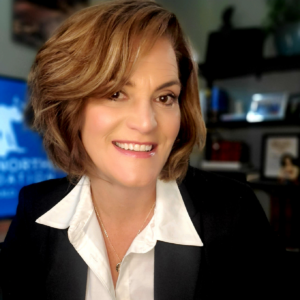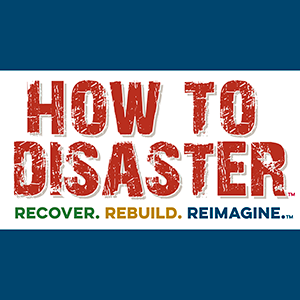Two seasons have passed since you walked this journey with us on How to Disaster. As we close the season and welcome another, we want to express our eternal gratitude to you for the support and love you’ve shown for the show.
In this episode, Jennifer sums up heartwarming lessons we’ve learned about humanity, disaster, and community. May these lessons inculcate in our hearts that we are not alone- we never are and we will never be.
You can find all of our episodes conveniently located on our YouTube Channel page, or below in the following links to each season. Season Three will begin in 2022, and we’re looking forward to bringing you many more professionals who have experience in the disaster response, recovery, community engagement, philanthropy, and public health sectors.
Thank you again!
“You are not alone if you’re going through a disaster. What we share is humanity.” -Jennifer Gray Thompson
Highlights:
- 00:37 The Story Behind How to Disaster
- 03:15 Show Up for Humanity
Quotes:
01:32 “Until you go through it, you don’t really understand it.” -Jennifer Gray Thompson
02:50 “We believe that the way our lives look today is what they will look tomorrow. But the one thing that life teaches us is that, that is not something you can take for granted.” -Jennifer Gray Thompson
04:03 “It’s not about politics. It’s not about what we don’t hold in common. But it’s about what we DO hold in common.” -Jennifer Gray Thompson
04:57 “You are not alone if you’re going through a disaster. What we share is humanity.” -Jennifer Gray Thompson
Meet Your Host:
 Jennifer Gray Thompson is a lifelong resident of Sonoma Valley in Northern California’s wine country. She attended Santa Rosa Junior College and graduated from Dominican University with dual degrees in English and History, and earned a master’s degree in Public Administration from the University of Southern California’s Price School of Public Policy. After the devastating fires of October 2017, she accepted her current position as Executive Director of Rebuild Northbay Foundation (RNBF), a long-term post-disaster organization dedicated to helping our region rebuild better, greener, safer, and faster. In this capacity, Jennifer has traveled across the country to share the innovative model of RNBF with colleagues and newly disaster-affected communities. Jennifer resides in Sonoma Valley with her husband, Douglas, children, and two rescue dogs, Buddy and GiGi, who have both randomly appeared in podcast cameos
Jennifer Gray Thompson is a lifelong resident of Sonoma Valley in Northern California’s wine country. She attended Santa Rosa Junior College and graduated from Dominican University with dual degrees in English and History, and earned a master’s degree in Public Administration from the University of Southern California’s Price School of Public Policy. After the devastating fires of October 2017, she accepted her current position as Executive Director of Rebuild Northbay Foundation (RNBF), a long-term post-disaster organization dedicated to helping our region rebuild better, greener, safer, and faster. In this capacity, Jennifer has traveled across the country to share the innovative model of RNBF with colleagues and newly disaster-affected communities. Jennifer resides in Sonoma Valley with her husband, Douglas, children, and two rescue dogs, Buddy and GiGi, who have both randomly appeared in podcast cameos
Transcription:
Jennifer Gray Thompson: My name is Jennifer Gray Thompson, and I am the CEO of After The Fire. Welcome to the podcast, How To Disaster, recover, rebuild and reimagine. In this podcast, we bring you the very best practices, best hearts and great ideas from other disaster-affected communities. Thank you for joining us.
“Until you go through it, you don’t really understand it.” -Jennifer Gray Thompson
So here we are at the end of Season 2, and my team has asked if I would actually do some reflections on the podcast and the guests that we’ve had in Season 2, but I actually had to go all the way back to Season 1. You know, we decided to start this podcast because you’re in the middle of COVID and we’re wondering, how do we stay absolutely productive and serve people in a way that is non contact essentially. And I was really motivated to do this podcast because I have met such amazing people along the way. I don’t ever love the reason why I show up in a community because it’s usually the basis of pain. I don’t necessarily love, I don’t revel in the disaster itself, but I do sort of swim in the humanity of it. I absolutely crave and adore the side of this podcast that really brings forth the human faces and human stories of, who’s involved in disaster? And how did they get here? And also, how do you do it? Because the one thing that stays exactly the same is until you go through it, you don’t really understand it, and the amount that it sort of disrupts your way of thinking.
“We believe that the way our lives look today is what they will look tomorrow. But the one thing that life teaches us is that, that is not something you can take for granted.” -Jennifer Gray Thompson
I was thinking about this even last night as I was locking up my house. And right now where I live in Sonoma Valley is harvest season, and there was a big Harvest Moon, and I actually can’t see it from where I live. But what I could feel is that it was really warm outside and it was a little bit breezy. And I thought about a fire survivor that I met right after our fires who explained to me that the night of the October 8, 2017 fire, she had been awakened, and they went downstairs and looked out their window not thinking really anything was going on. And all of a sudden, realizing that they were surrounded by fire, and mega fire. And all they had time to do was grab one cell phone, no shoes, no clothes, and run for their lives. And they had to do that for over a mile on a windy road before a public sector, a police officer actually picked them up and evacuated them. That’s a harrowing story. And I was thinking about that last night as I was sort of deciding what part of my house, I would shut the windows and I was thinking about how we live our lives in this way that we absolutely believe that the way our lives look today, that they will also look tomorrow.
“It’s not about politics. It’s not about what we don’t hold in common. But it’s about what we DO hold in common.” -Jennifer Gray Thompson
And the one thing that life teaches us is that that’s just not necessarily something you can take for granted. And I think the COVID has absolutely driven that point home for many of us. There are over 670,000 people who have died in the past two years. Now, we’re going into your three pretty soon of COVID. And all those people had families attached to them, and it’s the same in any disaster. Everyone is absolutely affected on a visceral level. And if we can actually be there and show up for humanity in a way that is not political, it’s not divisive, nobody reaches out their hands and asks you if you’re a Republican, or a Democrat, or independent before they decide whether or not they’re going to rescue you from a collapsed building. They just do it because it’s the right thing to do. And that’s actually what I love about disasters, and sharing these people with you is, they do it because it’s the right thing to do, and they don’t use politics to actually get there, they bypass it, or utilize the influence maybe, but it’s not about politics. And it’s not about what we don’t hold in common. It’s always about what we do hold in common.
I hope that you have enjoyed this season of the podcast, How To Disaster. I definitely want to thank Kyle Burnett who is our Podcast Producer. He probably has a lot of hot cuts of me being a little bit mouthy at times. I might have sworn a few times, but only because this is not as easy as it may look like anything else. But certainly, it’s important and he’s done a really good job, great job. And then also Melissa Stone from our team for all of her work with Kyle and then laying and her team of editors, and it does take a lot of people to actually get this done.
“You are not alone if you’re going through a disaster. What we share is humanity.” -Jennifer Gray Thompson
All of us have the common goal of demystifying how it is that you deal with disaster, and how you can avoid it, and how you can recover from it. And to remind all of you that you are not alone. If you’re going through a disaster, it can be a personal disaster or it can be a massive disaster. But what we share is humanity and that’s always at the core of what we do. And so thank you once again for your time, and your attention, and your care for this issue. And this is the podcast ending for a little bit. We’ll be back with Season 3 of How To Disaster in just a couple of months. Thank you.

